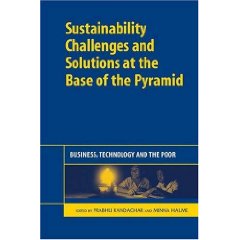 Sustainability Challenges and Solutions at the Base of the Pyramid
Sustainability Challenges and Solutions at the Base of the Pyramid
Business, Technology and the Poor
Edited by Prabhu Kandachar and Minna Halme
Greenleaf Publishing
This powerful book of essays addresses the challenges of global poverty and energy problems and offers possible solutions that corporations, individuals, and brands can help, either in the real world or via online platforms.
At the heart of it: a Base of the Pyramid (BoP) concept of starting from the ground up, much like grass roots community organizing, that builds over time with commitment, social conscience, and need…
The book covers a number of area – foremost, much of the current BoP discussion emphasizes targeting products to the needs of the poor. But do we actually know what the real needs of the poor are? they ask. This essays in this book take a bottom-up human-centered approach and examines examples that truly engage the poor in BoP product and service development. What types of needs assessment methodologies are indicated considering the cultural differences in BoP countries? Are the existing methodologies adequate? Do they need to be redefined and redeveloped? The answers lie within.
Secondly, the book considers how we can balance poverty alleviation and stimulate economic growth without stressing the ecosystem. Tragically, the poor are hardest hit by the adverse effects of environmental deterioration such as water shortages, climate change or the destruction of habitats. While the economic welfare of the poor is critical, the BoP approach must balance its inherent paradox of encouraging greater consumption while avoiding further pressures on environmental sustainability.
Third, the essays consider innovation and inquires into what kinds of bottom-up innovations (open source, technological, social and business) tend to support BoP initiatives. For instance, does Open Office advance the education of those who cannot afford to buy Microsoft Word? What is the trend of educational institutes using open source operating systems and software over corporate technology, and how does this impact community and society, and ultimately the economy?
The essays also question if a BoP strategy is the antithesis to development aid or can these two co-exist or even complement each other?
Needless to say, the relationship between corporate responsibility and BoP is a controversial one.
For instance, is BoP a new form of corporate neo-colonialism or a new form of corporate responsibility?
We’d like to think responsibility.
The team at Ninthlink firmly believes that all companies do well when giving back to the community. We have strived to do such with our drives for various non-profit and community groups that aid those in need, as well as our work for non—profit websites that are socially conscious and green at heart.
It all adds to a little more good in the world.
